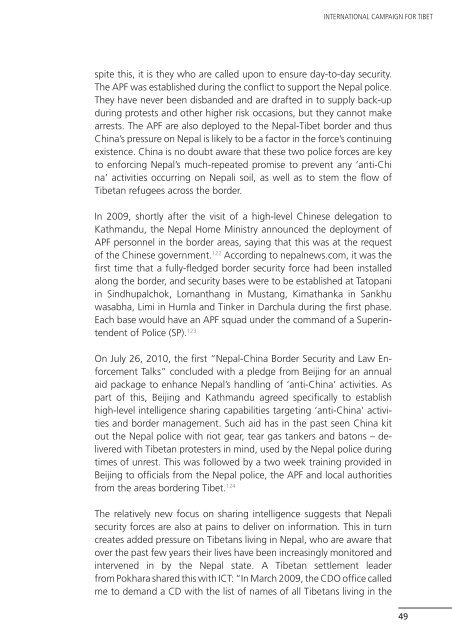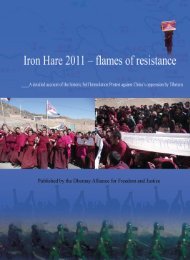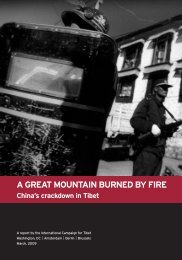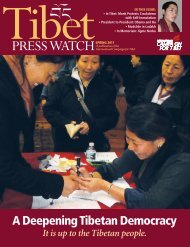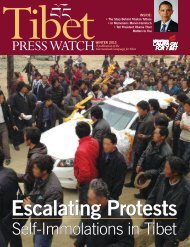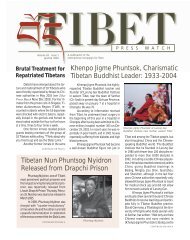DANGEROUS CROSSING: - International Campaign for Tibet
DANGEROUS CROSSING: - International Campaign for Tibet
DANGEROUS CROSSING: - International Campaign for Tibet
You also want an ePaper? Increase the reach of your titles
YUMPU automatically turns print PDFs into web optimized ePapers that Google loves.
INTERNATIONAL CAMPAIGN FOR TIBET<br />
spite this, it is they who are called upon to ensure day-to-day security.<br />
The APF was established during the conflict to support the Nepal police.<br />
They have never been disbanded and are drafted in to supply back-up<br />
during protests and other higher risk occasions, but they cannot make<br />
arrests. The APF are also deployed to the Nepal-<strong>Tibet</strong> border and thus<br />
China’s pressure on Nepal is likely to be a factor in the <strong>for</strong>ce’s continuing<br />
existence. China is no doubt aware that these two police <strong>for</strong>ces are key<br />
to en<strong>for</strong>cing Nepal’s much-repeated promise to prevent any ‘anti-Chi<br />
na’ activities occurring on Nepali soil, as well as to stem the flow of<br />
<strong>Tibet</strong>an refugees across the border.<br />
In 2009, shortly after the visit of a high-level Chinese delegation to<br />
Kathmandu, the Nepal Home Ministry announced the deployment of<br />
APF personnel in the border areas, saying that this was at the request<br />
of the Chinese government. 122 According to nepalnews.com, it was the<br />
first time that a fully-fledged border security <strong>for</strong>ce had been installed<br />
along the border, and security bases were to be established at Tatopani<br />
in Sindhupalchok, Lomanthang in Mustang, Kimathanka in Sankhu<br />
wasabha, Limi in Humla and Tinker in Darchula during the first phase.<br />
Each base would have an APF squad under the command of a Superin-<br />
tendent of Police (SP). 123<br />
On July 26, 2010, the first “Nepal-China Border Security and Law En-<br />
<strong>for</strong>cement Talks” concluded with a pledge from Beijing <strong>for</strong> an annual<br />
aid package to enhance Nepal’s handling of ‘anti-China’ activities. As<br />
part of this, Beijing and Kathmandu agreed specifically to establish<br />
high-level intelligence sharing capabilities targeting ‘anti-China’ activi-<br />
ties and border management. Such aid has in the past seen China kit<br />
out the Nepal police with riot gear, tear gas tankers and batons – de-<br />
livered with <strong>Tibet</strong>an protesters in mind, used by the Nepal police during<br />
times of unrest. This was followed by a two week training provided in<br />
Beijing to officials from the Nepal police, the APF and local authorities<br />
from the areas bordering <strong>Tibet</strong>. 124<br />
The relatively new focus on sharing intelligence suggests that Nepali<br />
security <strong>for</strong>ces are also at pains to deliver on in<strong>for</strong>mation. This in turn<br />
creates added pressure on <strong>Tibet</strong>ans living in Nepal, who are aware that<br />
over the past few years their lives have been increasingly monitored and<br />
intervened in by the Nepal state. A <strong>Tibet</strong>an settlement leader<br />
from Pokhara shared this with ICT: “In March 2009, the CDO office called<br />
me to demand a CD with the list of names of all <strong>Tibet</strong>ans living in the<br />
49


